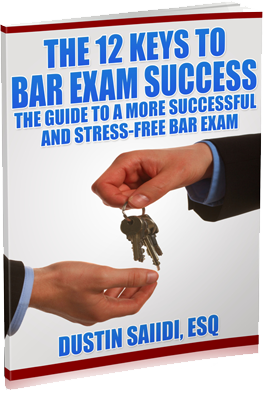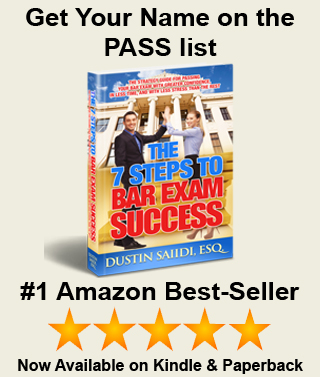Today, we go 1-on-1 with the bar exam legend, the Grand Poobah. He will share the 5 things he did that took him from Bar Exam repeater to Bar exam passer. Take a listen!
1) Review actual sample answers
2) Study the MBE topics first
3) Focus on Improving the Weak areas
4) Finish Outlining Before Writing Essays
5) Be Very Complete, at least at beginning of essay
BONUS BAR EXAM TIPS
6) Don’t neglect a topic you originally passed on prior bar exam
7) Focus on Writing Answers, not reading outlines
8) Write Like a Lawyer
Visit the Grand Poobah’s Blog and send him an email at bllypoobah@gmail.com.
Here is the full transcript:
Intro: You’re listening to the IPassedMyBarExam.com podcast. Helping you pass your bar exam with ease and confidence, episode number 16.
Dustin: Hello and welcome, future bar exam passers! My name is Dustin Saiidi, author of the 7 Steps to Bar Exam Success. And today we’re going to bring someone on the call today who went through a lot of mistakes as he was preparing for the bar exam, and he’s going to tell you what those mistakes were and how you can avoid them. So, this individual actually took the bar exam 10 times, finally passed on his 11th. He’s a well known legend in the bar exam space and he goes by the Grand Poobah. So without further adieu, let’s here what the Grand Poobah has to say about the bar exam.
Alright, hello and welcome to the call! We’re here with Brian Johnston a.k.a. the Grand Poobah, that you may know from bar exam prep who has been kind enough to come on to the call today. And today, Brian is going to share the 5 things that took him from being a repeater into becoming a bar exam passer. He took the bar exam 10 times, didn’t pass. But the 11th time is the charm, he was able to pass. And he’s going to share with us today kind of what happened in that 11th time to make him a passer. So, how are you doing Brian?
Brian: I’m doing well, thanks.
Dustin: Thanks for coming on the call today.
Brian: Sure, Dustin. No problem.
Dustin: If you want to just give a little bit of background about you and kind of your experiences with the bar exam in general, so people get to know who you are.
Brian: Well, most of who I am is already up on the blog. I think I shared most of the publicly available information. I’m a 55 years old, and I went to law school at 45 and graduated on time and then it took me a few years, 5 years I guess, to pass the bar. But prior to going to law school I worked in information technology as a programmer and did technical support for a large memory company in Orange County, and migrated to web design – the old acronym for web master. That’s what I did, I maintained a website. And then as my skills became stagnant, I decided I had to move on to something more lucrative for my future and something that I can do until I’m old and gray, even though I was already old and harshly gray. And so I cashed in before ??? and paid up my bills and went to law school with the hopes of being to now work until my feeble years until I could barely get to court and represent people or do whatever I wanted to do.
So I guess much more flexibility was my thinking, and it would ensure me that type of maintaining a consistent stream of income throughout my life, instead of having to rely on the fickle I.T. Business industry to keep that up.
Dustin: Wow! Well, I admire you for having the courage to take the leap at that point in your life, and then also the discipline and persistence to keep fighting through it until you broke through. So, definitely admired the persistence.
Brian: Yeah, after 2-3 years of trying I had – many people had suggested that I quit or go do something else. I mean if you’re familiar with the blog, you’re familiar with the naysayers on there, and a lot of them suggested I go off and do something else. But at the point I have so much time and money invested in it, it was really not a realistic option to quit. And so, I was almost forced into continuing and I’m really glad I did because I’m extremely satisfied now. Things couldn’t be better, well they will get better, but right now having accomplished this is a hugely satisfying achievement.
Dustin: That’s great! How was it dealing with that, with kind of going through the process of not passing and/or having people telling you, maybe you should give up or quit. How’s that emotionally, how did you deal with that?
Brian: Well, it’s pretty much as what you would expect, it’s a constant torment. I mean, when you talk amongst people – laypeople who hadn’t gone to law school, they don’t really understand. They don’t know what law school’s like and they don’t know what the bar exam is like and they don’t know any of the associative pressures and the things which go along with that. So I kind of write that off because they just didn’t know. But amongst my peers it was tough because there’s a lot of people out there who went to law school and haven’t yet passed the bar, and there’s kind of a threshold where you’re considered reasonably successful for. I guess your smart or something for having gone in to law school and graduated, but until you’ve actually pass the bar you’re kind of like a second class citizen. People are like, “Yeah great, you went to law school.” But in the change in people’s perception, and the way they treat you and talk to you and everything else, after having passed the bar is tremendous.
So the whole time, I was just dealing with the stigma of having gone to law school and graduated but not having passed the bar exam. And most of my friends said it didn’t bother them and they still, I was still their friend. But personally it was tough to include myself amongst them simply because I hadn’t passed yet and it was an achievement that I struggled with, in a stigma if you will. Kind of a scarlet letter that I attach to myself and I wore everyday. And I think I hid it pretty well, the disappointment of not having passed. But man, it was tough. Every single day.
And plus, me starting my blog and having my face up there, going to the bar exam every time people will recognize me. Some people will talk to me and some people will just point and kind of talk to their buddies.So there was a little more pressure because of that as well. It was tough but you just have to log-on, just forget about it and put your head down and keep working, and know that someday you’ll get through it. And that was the attitude that I had. I knew I was smart enough. I knew I know enough about law. I knew I had to keep going and so I did.
Dustin: Awesome! So let’s talk about what are the 5 things that really, you feel that you did differently that time that you passed, that took you from repeater to bar exam passer. What are kind of like the top 5 tips that you give?
Brian: Well the first thing, as I mentioned on the blog, was that I gave up on my manic adherence to the strict direct method. Being a programmer and all, the level of attention to detail that you have to employ in that business to be successful is immense. You have to cover all the options, all the basis, you have to code for all the different possibilities and all the different variable, the way people will input it and the way they come out – that kind of thing. So, when I look at a question I would do the same thing. It’s like, “Okay, I have to consider all the facts, from all different angles, and I have to try and code for them if you will. I have to try to write in them my solution.” And I discovered that after a while I wasn’t able to get nearly enough analysis on the paper because I was so busy trying to include every fact and every possible way it could fit. And I just wasted a lot of time, with a lot of extra words I didn’t need.
So i gave up on the strict direct, and I decided to just kind of wing it, if you will. Because I looked at some of the model answers closely, finally, because I kind of been avoiding them. I was just off to myself, “You know my answers should be good enough. I’m not going to look at someone else’s answer.” But I finally forced myself to, and I notice that they had the issues and the rules and the elements there. Once they got the analysis part, they kind of free-flowed a little bit. They showed a level of comfort with the subject that showed the grader that they knew the material. And I think the ability to write in that casual way while still addressing all the facts and relaying all the rules but not in such a strict way shows that I was comfortable with the material and that I can write about it confidently and competently and in a lawyer-like way, like they say you should.
So that was a big change, that was partly due to the fact that I kind of throw in the towel and say “Screw them. Piss off myself and everything else, I’m just going to write what I think instead of what I think they want to see.”
Dustin: Very interesting. So something that changed, again, for you then was look at that sample model answers and seeing kind of how are they wording it and then that helped you cater your writing style in that manner.
Brian: Yeah, and I also looked at some past answer that hadn’t scored so well. There’s a website or two out there that have a collection of past answers. And looked at the way they wrote, looked at the way the passing answers wrote, and notice the same difference. So in the back of my mind I was thinking, “You know, that’s probably something I should aspire to and I just hadn’t done it, hadn’t been able to do it, hadn’t been able to break free of my background enough to do that.
Dustin: That’s awesome. So I hope all the listeners on the podcast go and look at some sample answers to see exactly what is it that looks good. What is it that’s passing, so that they know what to write. And I know that helped me in my bar exam a lot, when I actually saw an actual 65 passing answer then I saw kind of what it is that people are looking for, what’s really need in order to pass. That really changed the game for me as well.
Brian: Right. And right after, they should pay attention to, right after the issue and the rules stated. The bar obviously puts different styles of answers out there, but one thing I notice was, they don’t write – and in the front of the essay packet they say “Don’t just write the law, so that you understand what you are talking about.” And you see that these people kind of go on a risk. They just start writing about the fact and the rules and it become more casual. And that’s what I noticed, and I hadn’t paid attention before.
Dustin: Okay, awesome! What’s the second thing that you did?
Brian: I started this actually in February, for the February exam of 2012. I started studying my MBE subjects first, and I went through all those and made sure I was comfortable with them and remembered all the rules because the MBEs are 35% of your grade and they’re also roughly half or better of the essays. So I thought that, if I knew the MBE subjects, forward and backward, I would cover most of the material. So I made a conscious effort to get those down first before I move on to the other subjects. And I think that helped because, you know, 3 of the essays or so, are MBE subjects and they’re going to be crossed over on 1 or 2 others. I felt like I did myself a favor by doing that because the information was really ingrained in my brain. Of course it all was by that point, I’ve taken the darn thing 10 times. I thought I knew the rules pretty well but I still wanted to re-enforce those.
Dustin: Right. Brian, you should read my blog in 2011, that’s the exact advice I give is to study the MBE topics first.
Brian: Oh okay, great!
Dustin: Obviously, Brian is not reading my blog but that’s okay. Yeah and I agree because if you study the MBE topics first, let’s say you spend 3 days per topic at least getting that first overview, you’ll hit all the MBE topics and about half your essays within the first 3 weeks. So the first 3 weeks you’re almost quote"e, I don’t want to say half way done or whatever because again you’ll review them over and over, but you have seen about half the materials in the first 3 weeks which is fantastic. So I agree completely with that advice. What’s your third thing that you did?
Brian: Let’s see, I decided to forego studying, well not forego, but I decided not focus or not to study my strong subjects – the subjects I consider my strong ones, so much. And focus on the ones that I feel like I can improve on, and for me that was Civ Pro, and Con Law, and Real Property, and 1 or 2 others. With the thought that I wasn’t going to prove a lot on my strong subjects. I mean, I knew them pretty well and I always score reasonably well, and then of course within the realm of scores that I got were not all that impressive. But I felt like there’s a little room for improvement there, but the subject that I kind of felt I was average in or I felt you know, middle and comfortable, I wanted to get comfortable with those.
So I studied those a lot and I pretty much gave up on the ones I was weak on, I figured you know, the heck with it. I’ve been studying this things for 5 years and I’ve never improved those. So I’m just going to wing it on the bar exam when I get there. So I studied primarily, the subjects that I felt like I could improve on and just consign to the dust bin, if you will, the subject that I knew I was going to do poorly on. And hoped that I could bring my other scores up sufficiently to cover for those.
Dustin: Oh, okay. So when you took the bar, did you find a lot of those topics, like what are the topics did you get? Did you find the ones that you were strong at or the ones that you really didn’t know?
Brian: Well you know, I always complain about Civ Pro and I always say that I really didn’t like Civ Pro; one of my least favorite subject and probably is still is, but I worked hard on that. And then, in this last exam, we had a situation where there was a Canadian corporation doing business in one state only, and these people got injured in a car accident and there was a subject manager takes in personal jurisdiction. And I knew the rules for alien corporations, and I thought when I saw that and I started writing, rules just bubbled out from my brain from what I had just studied over the last few weeks. I was actually happy, I was smiling on myself on that exam. And I was thinking that, “Wow, this is a Civ Pro exam and I’m liking it. And I actually think I’m doing well, this is bizarre.” So it really worked, it worked pretty well for me.
Dustin: Okay, cool! Alright, what’s your fourth thing that you did?
Brian: I outlined completely on my laptop before I started writing. In the past I had – you know, everybody always says, outline in your laptop or somewhere but complete your outline and outline the essay from there. But in the past I started my outline, and then I had written the rules, and then kind of filled in a couple of facts so I wouldn’t forget. And then pretty soon, 24 and a half minutes later, I find that I’m still filling in some facts and I actually find myself writing a little bit of analysis and then almost half way through the essay, I really don’t have anything concrete on the paper, if you will. So this time, I force myself to complete my outline on my laptop and then go back there and check it.
The one thing that I did was, especially on that Crim Law that we had where the guy had killed that lady – or it was Evidence, yeah it was Evidence. And they were bringing in the married confidentiality privileged and the married communication privilege. The first time through I put both those in the first call. And then having gone through my outline again before I started writing, I realized that the confidentiality privilege was in the second call and the testimonial privilege was in the first call, so that enabled me to straighten up my outline before I started writing so I didn’t find myself halfway through struggling to figure out what I had to re-arrange and where I had to put something and such a way, loose my train of thought. That helped a lot. And on that one and on the Criminal Law one where the guy had the gun, that one as well, it helped a lot. Criminal Procedure that one was, Criminal Law or Crim Pro.
Dustin: Was the fact that you completed the outline that helped a lot or was it the fact that you wrote it in your laptop or a mix of both?
Brian: The fact that I completed it. I would first, try and write it on paper. In the years passed I would try to write it on paper and then copy that on my laptop. This time I just did it on my laptop right off the bat. I’ve never had a laptop failure in the bar exam but I was warned against that. What happens if your laptop fails, you don’t have your outline, and it’s not some place where you can use it. But I decided to roll the dice and you know, it wasn’t that big of a risk, because I’ve never had a failure. Knocking on wood it wouldn’t happen again.
And so I outlined completely on the laptop, and I finished my outline and made sure that I gotten through all the facts and all the fact pattern and gotten the issues I wanted to get and then after I completed it, then I started writing. That was something I hadn’t done before. Seems obvious but I hadn’t done it.
Dustin: Okay, awesome! And what’s your fifth thing?
Brian: I decided to – most of the thing that I was taught very recently, to start really strong on the first page because the grader is going to look at the first page. And they’re going to get an overall information of your essay based on that. And then that overall impression will carry on to the rest of the essays, so really I focused on being very comprehensive and complete in my analysis on the first page and the first issue and then, I kind of went in to automatic mode for the rest of it. And then when about 10 minutes to go, I slowed down and I went back and reviewed everything I had written. Made sure I completed every issue, completed every analysis, I come into a conclusion, did my spell check and everything else and basically closed up properly, make sure I could finish.
So that was a logical way to proceed through the fact pattern that I had employed before, it helped me organized and stay tracked of time. And I think it presented a better picture of what I was writing to the grader, at least I hope it did. I hope my writing improved on this thing and it wasn’t just an MBE score of a 180 that got me by, but that was it. And I also continued to focus throughout on my MBEs. I never let them slide, I kept upon those even though I have a historically high MBE score, relative to everyone who had their MBE score back. I made sure I kept up on those, maintained my skills at there.
Dustin: Okay. So you didn’t – sometimes people, when they fail the first time, the second time they’ll say, “Oh I passed the MBEs but I failed the essays, so I’m only going to do the essays.” or vice versa. So you’re saying to keep up to both of them. Don’t just let one hang and go for the other one.
Brian: Right. And I always thought that was a little risky, and that’s one reason I never skipped an exam. I didn’t want my skills on anything to diminish, I want to maintain the good performance that I have always had. And over the years my MBE scores gradually gone from a low of 123, the first time it was 128, then it was 123 and then it gradually went up and up and up. In February 2012 I got a 149 and a raw MBE score. And I wouldn’t be surprised, and I say this with all humility if that’s all possible, that I wouldn’t be surprised if my MBE scores is closer to 160 this time than it was 150 because I felt like they were very easy. I felt that way before and hadn’t gotten negative scores so, I could be wrong but, I feel like I improved on those so even if I didn’t improve dramatically on my essays and my PTs I felt like I maintained my MBE score. And if I improved that then that might have, well obviously, the combined scores were enough to pass. I don’t know if they were but I still wanted to maintain may MBE skill.
Dustin: I got you. Brian did you ever take a bar prep program at some point?
Brain: Yeah. You know, I’ve taken a number of them. Right in to law school, I was the bar re-lec in our school for my class so I sat through bar re-lectures and I’ve taken a number more over the years. I could recall a few of them but I never felt like I got that much out of them because the tutors or the people who run the programs, I find that typically they just stood in front of the class – in front of the class they were teaching. And most of them lectured from an outline, some of them didn’t take questions. It was basically a re-hash of what we had in law school, professor up there teaching the law. And we had a pretty good grasp of the law at that time, and I would go to the classes and sit there and wonder what I was doing there and what I was learning because I knew everything they were saying. You know, I can follow through on my outline and read, and it was like kind of “Duh, that’s kind of obvious.” Burglary is still a burglary, a murder is still a murder, and homicide is what it is, and manslaughter and whatnot. There wasn’t so much value added to most of them over the years until recently.
Dustin: Did the time that you pass the bar exam which was by the way, this past summer, so again congratulations. Did you do any bar prep or specifically for that time as well or no?
Brian: Yeah. You know, to name names, I used Jason Tolerico’s program. I used him primarily when I started for the February 2012 exam. And I studied a lot starting in December all the way through the exam on that one, and I felt like I rebuilt my foundation; that same foundation I had in law school, when I got in law school, of the material. And then after I failed in February 2012, I didn’t work so much in memorizing. I worked more on my writing, well in fact, I didn’t work nearly as hard as I had before. I try to get more work – work done, more paying more done. But yeah, I used a tutor for the whole last year and I think he was instrumental in my passing because of his philosophy and his attitude and the way he taught how to approach this things and to break them down and attack them and be comfortable with them.
Dustin: You mentioned something too, you’ve said you worked more in your writing not your memorizing, can you clarify more on that too?
Brian: Yeah you know, I’m sure everybody knows, you go through an outline for the hundredth time and it’s de javu all over again. And its’ an outline, it’s what we learn in law school, and you can only get so much out of it through repetition. I mean, yeah it helps to refresh the rules in your brain for each bar exam, but there’s only so much benefit you can get from that. I mean, after a while the rules just pop into your head. So after going through a few outlines, this time I realized that I was wasting my time or at least it wasn’t the best use of my time. So that’s when I started to look at the released answers and a properly constructed passing answer. I think that was where I was really trying to figure out what the heck it is that I was doing wrong. And why my really nice IRAC answers were not given good scores, and try to compare the two and figure out what a passing answer look like. So I was working on my writing, trying to modify my writing style to match the passing answers.
Dustin: Wonderful! That is a wonderful tip! So the 5 that I have here, again; kind of improving the writing, looking at some model answers was the first one. Starting at the MBE topics first was the second one. Focusing on where you can improve was the third one. Fourth one was completing your outline and if necessary doing that in your laptop. And then fifth was really giving a good impression to that grader on that first page so, I think you’re right, they do form a snap judgment based on what they see on that first page and how they’re going to grade it.
Brian: And I try to carry that over to the performance exams too because I always felt like I’ve done decently on those. I’ve never really gotten – well, I got the occasional 65, mostly it was 60s and 55s on those. And this time I kind of carried over my – the damn torpedo is full speed ahead, you know, kind of casual attitude on the PTs as well. And prior to this exam, I had a bad habit of copying a lot of material from the library into my answer which wasted a lot of time. This time I didn’t do that and I just work more on analysis. And I also attacked the library first instead of the file, and I think that might have helped me as well.
Dustin: Very good! Awesome, great tips! Do you have anything else, any other bonus that you want to mention to help law students pass the bar exam?
Brian: I would just say that everyone who graduates law school knows enough law to pass the bar exam and I think the stress of the situation causes people to kind of get out of their comfort zone. I don’t know if you remember those old football games, those little oy games where you put all of this men in the table. You turn them on and it vibrates and it kind of move around, and then one guy touches another and it’s like, “I gotcha!” I felt like my brain was kind of that way when I sat for the bar exam. I would stress a little, I would ramp-up, and I would loose focus and I would be unable to write like I feel like I can write or when I practiced. So you know, calming down, having the confidence level to know that you can pass this thing, and not worrying so much about what the grader is going to think of it but just writing comfortably. Writing like you know what you’re talking about. And I keep going back to that blur right in front of the essay packet that says, “They’re looking for a lawyer-like analysis.” And so talk like a lawyer and write like you’re comfortable with the material and I think that’s a big key.
Dustin: Awesome! Fantastic, I love it! Well, thank you so much Brian for coming on. Oh and I didn’t ask you this, your Grand Poobah. Where did Grand Poobah come from?
Brian: Oh well, when I was a kid, and I was a really little kid, we used to play with carton trucks in the backyard and dirt. And we would always have the names of the characters that died frequently and they would always have the last name of Poobah. And so that was Janie Poobah and Billy Poobah, and whatnot. And then when I was thinking for a name for the blog, I was thinking I had to incorporate some kind of casual name in there that I could use. And then back in the Fred Flintstones cartoons when he was the Grand Poobah and the leader of their lodge, it just seems like an easy pick, an easy name. Not pretentious and kind of self-deprecating, if you will. Even though it’s applied as Grand Poobah in us, but I was kind of a big fun of it myself and it works. It works.
Dustin: Well, it works for your own style I guess. Okay so, and if people want to get in touch with you, what’s your blog site? The name is kind of a funny url.
Brian: Yeah, it started back in 2007. It’s CaliforniaGBX0707@blogspot.com.
Dustin: Okay, I’ll have a link to that in the website as well.
Brian: Yeah, my email address is on there somewhere so anybody can send me an email.
Dustin: Okay. So yeah, if anybody has question or want some advice from you, I’ll find the email and I’ll put it on the website as well. Thank you so much Brian for coming on. I really appreciate it.
Brian: You’re quite welcome, Dustin. Thanks for having me.
Dustin: Sure, and we’ll talk to you again at some point.
Brian: Very good.
Dustin: Alright and there you have it, the Grand Poobah of the bar exam giving his more than 5 tips to go from repeater to passer on the bar exam. If you want to visit his blog, it’s got kind of a funny url, you heard him say it. Also, you can go to IPassedMyBarExam.com/GrandPoobah, and you can take a look at his blog. Also his email is bllypoobah@gmail.com so head on over to the site and see if he has some advice or send him an email if you want to ask questions about the bar.
Alright, and don’t forget to sign-up on my newsletter for the IPassedMYBarExam.com and get your 12 Keys to Bar Exam Success, go ahead and do that now and I will send you the 12 Keys to Bar Exam Success. And also, quick tips about the bar exam throughout your bar exam prep. So get out there and crush it this week. Go do a great job, and in time your name too, will appear on the pass list. Take Care.










{ 0 comments… add one now }